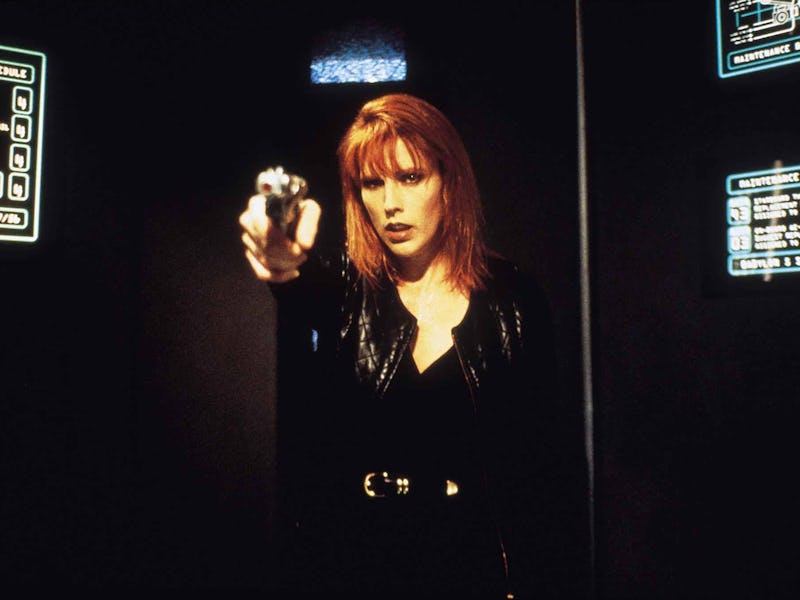The Most Groundbreaking Sci-Fi Show of the ‘90s is Still Worth Watching
The dawn of modern TV started here.

Before the 1990s, TV science fiction was perpetually behind the eight ball with the general public. Whatever seemed profound and provocative to hardcore sci-fi fans was sometimes obscured by aesthetics or a perceived lack of believability. Sure, Captain Picard was inspirational on Star Trek: The Next Generation, but the coziness of that kind of space opera also sometimes felt more like fantasy than science fiction. Did people use the toilet in the future? Would they really dress like that?
Starting in 1993, the same year as Star Trek: Deep Space Nine, one space-based sci-fi show dared to do what was then the unthinkable. Instead of making its space heroes seem cool, slick, or collected, Babylon 5 took a more straightforward approach: what if these characters weren’t role models, but just regular people? All five seasons of this groundbreaking show have just returned to Amazon Prime Video, and if you’ve slept on Babylon 5 over the years, or it's been a while since you’ve watched, one reason to revisit it is its subtle yet essential groundedness.
While some sci-fi folks like to think of Deep Space Nine as an underdog TV series, forever in the shadow of The Next Generation, there were a whole host of other ‘90s sci-fi shows that were underdogs relative to the Trek franchise. As much as DS9 might have felt like the country cousin within the Trek franchise, there were all sorts of other sci-fi shows that were even more underrated. And if you’re looking for a starter pack of underrated but excellent ‘90s sci-fi TV shows, you’ll put Sliders and seaQuest, on that list. But, you’ll also find that Babylon 5 has probably aged the best, and because it's a big, bold space opera, it's the only ‘90s sci-fi TV series that gave the Trek franchise a run for its money.
Created and largely written by J. Michael Straczynski, Babylon 5 focuses on humans and aliens living on the eponymous space station, trying to stop, or win, various space wars. Before DS9, Battlestar, or The Sopranos made serialization the norm, Babylon 5 presented massive season-long arcs. Yes, there were a few stand-aloneish episodes, but even when you go back and watch those ones (“Gropos,” “TKO,” et al.) you’ll find interconnections and world-building details that are relevant to the entire series in each.
Mira Furlan and Claudia Christian in Babylon 5’s first season.
Much has been written and said about Babylon 5’s fascinating and bold serialization. You’ve also probably heard that this series is steeped in science fiction lore, so much so that you could begin your sci-fi education with Babylon 5 as your rosetta stone. But what perhaps doesn’t get said enough is just how goofy, messy, human, and real the characters are throughout the series. Nobody could excuse Babylon 5 of being squeaky-clean like The Next Generation, but the brilliance is that the show isn’t hardcore dark or anything like that either.
Take a character like Susan Ivanova (Claudia Christian). She’s a tough-as-nails second-in-command to the space station, but being a hardass is also, refreshingly, not her entire personality. Beloved by fans for her quips (“I'm in the middle of 15 things, all of them annoying”), Ivanova was also the kind of person who got a drink with her colleagues when she was worried about one of them. Speaking of drinking, then you’ve got Michael Garibaldi (Jerry Doyle), the security chief, who, at first, you think is coded to be like an outer space version of Bruce Willis from Moonlighting, until you realize he’s a recovering alcoholic, a fantastic detective, and also a huge fan of Daffy Duck.
The fact that Garibaldi has a massive poster of Daffy Duck in his quarters is also a low-key microcosm of the brilliance of Babylon 5. It’s not cool to be a full-grown adult with a massive poster of Daffy Duck in your house, but it is admirable. Garibaldi doesn’t really care what you think of him and his Daffy Duck poster, but then again, maybe he does because, as we get to know him, we find that he’s deeply insecure, super paranoid, and often correct to assume there are various sci-fi conspiracies happening around him.
To be clear, these are just two characters in Babylon 5, and one might argue they’re not even “main” characters. But the thing about B5 is that by and large, all the characters are written exceptionally well. This isn’t to say you’ll like all the characters, or that you’ll even relate to each of their quirks, jokes, hopes, and dreams.
Jerry Doyle takes aim as Garibaldi in Babylon 5.
Instead, Babylon 5 posits something entirely different with its characters — you can imagine them as real people in another setting. They aren’t just pieces of machinery created to move the plot forward. If anything, the ills of the world are happening to them. Lyta Alexander (Patricia Tallman) didn’t want to resign from the state-run telepath group, the Psi Corps, but eventually, she was forced to. G’Kar (Andreas Katulus) only wants to take revenge for crimes committed against his people, the Narn, but by the end of the show, is the biggest advocate for peace in the universe. Meanwhile, the defacto “chosen one” of the show, Captain Sheridan (Bruce Boxleitner), didn’t even want to be there at first and wasn’t even in the first season at all.
In this way, Babylon 5’s writing mirrors the uncertainty and unpredictability of real life. Characters in this show may be on certain missions, but they don’t have a destiny. No one is safe here, but that doesn’t mean they can’t try to be happy, too.